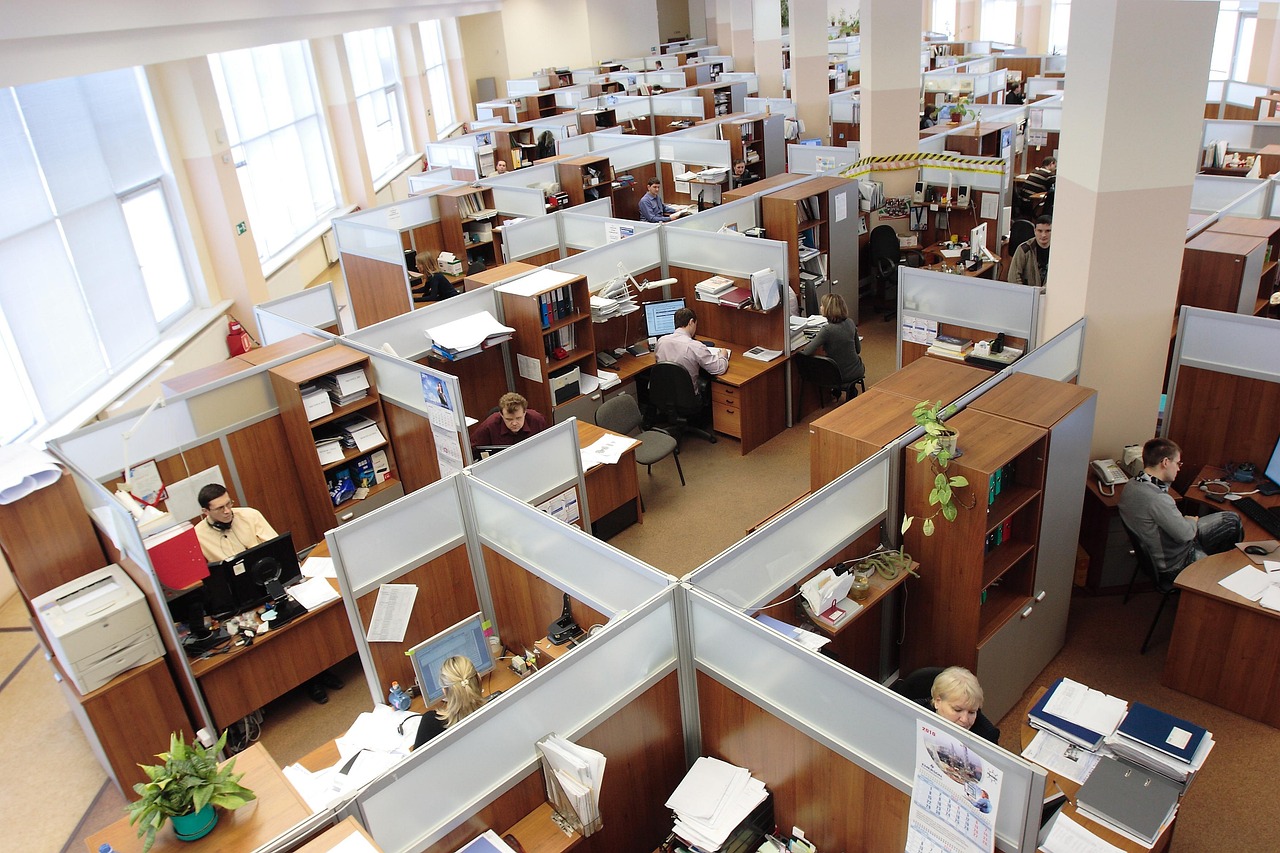I am planning to start a small business but am confused about whether I should rent a proper office space or go for a co-working space. I am not sure how many employees I will need in the first year, so I don’t really know how big an office I will require. If the business grows quickly, I may have to shift to a bigger office within a year or two. Would a co-working space be the right decision for me in the beginning? - Vishal Gurav (Mumbai)
Coworking spaces are growing in popularity and this may be the right choice for you, especially if you are not sure how many employees you will require in the near future. You can increase the number of seats in a co-working space as and when you require them, or even reduce them if you want. Learn more about the advantages of co-working spaces and why more and more businesses are using this route to grow quickly. Read on…
Table of contents [Show]
-
The Growth of Coworking Spaces in India: Changing the Work Landscape
- The Impact of Urbanization on the Rise of Coworking Spaces
- Enhancing Productivity in Coworking Environments
- Sustainability as a Key Factor
- Fostering Work-Life Balance in Coworking Spaces
- Tailoring Spaces to Unique Needs
- Cost Advantages of Coworking Spaces
- Corporate Embrace of Coworking Spaces
- Location Flexibility: Redefining Where Work Happens
- Tech Integration: Revolutionizing Coworking
- Conclusion
The Growth of Coworking Spaces in India: Changing the Work Landscape
The rapid rise of coworking spaces in India has transformed the country's work landscape. In recent years, this flexible and innovative approach to work environments has gained immense popularity among a diverse range of clientele, including large enterprises, MNCs, corporations, unicorns, start-ups, and individuals. This trend has the potential to redefine how people work, fostering innovation, collaboration, and sustainable growth.
| There are approximately 19,400 coworking spaces available in the world, as of 2022. – Gitnux, A Global Commerce Media LLC Company |
The Impact of Urbanization on the Rise of Coworking Spaces
India's urban landscape is undergoing rapid transformation due to intense urbanization and population migration. This demographic shift has resulted in an increasing demand for office spaces that can adapt to the dynamic needs of businesses. In response to this changing landscape, coworking spaces have emerged as a well-suited solution. These flexible work environments offer a range of benefits that cater to the requirements of both large enterprises and small businesses.
As urbanization continues to reshape the country, traditional office spaces are facing new challenges. The fixed, long-term commitments associated with conventional offices are often incompatible with the evolving nature of businesses. Coworking spaces, on the other hand, provide a dynamic and adaptable solution.
Enhancing Productivity in Coworking Environments
One of the key attractions of coworking spaces is their ability to enhance productivity. These spaces are thoughtfully designed to provide a comfortable and focused work environment. This conducive atmosphere encourages professionals to thrive and achieve higher levels of productivity.
In a traditional office setting, employees may be confined to a rigid structure that lacks the flexibility needed to optimize productivity. Coworking spaces break away from this norm by offering a diverse range of workspaces, each tailored to different working styles and preferences. Whether you thrive in a quiet, individual setting or prefer a collaborative, open environment, coworking spaces cater to diverse needs.
| Coworking spaces are gaining popularity among businesses in India, with demand doubling in the past four years. – Livemint.com |
Moreover, coworking spaces often prioritize the creation of daily routines that support productivity. With access to amenities like ergonomic furniture, high-speed internet, and fully equipped meeting rooms, professionals can efficiently carry out their tasks without interruptions. This focus on productivity has been a driving force behind the growth of coworking spaces.
Sustainability as a Key Factor
The global shift towards sustainability has not left the coworking industry untouched. Many coworking spaces have taken proactive steps to incorporate sustainable practices into their operations. This commitment to sustainability resonates with environmentally conscious businesses and professionals.
In an era where climate change and environmental responsibility are paramount, having a "green office" is no longer a trendy feature but a fundamental necessity. Coworking spaces often implement eco-friendly initiatives such as energy-efficient lighting, waste reduction programs, and the use of renewable energy sources. These initiatives not only contribute to a healthier planet but also create a more attractive workspace for businesses committed to sustainability.
As a result, coworking spaces have become an attractive option for those companies that are looking to reduce their carbon footprint. Being part of a coworking community that prioritizes sustainability aligns with the values of many modern businesses and professionals.
Fostering Work-Life Balance in Coworking Spaces
In the fast-paced world of business, striking the right work-life balance is paramount for employee productivity and well-being. Coworking spaces recognize the importance of this balance and have incorporated various features and amenities to promote it. These spaces go beyond the conventional office setup and offer a holistic approach to work-life equilibrium.
One of the key ways in which coworking spaces support work-life balance is by providing a range of amenities within their premises. These amenities can include recreational areas, gyms, and on-site cafes. These additions are not merely about convenience; they play a significant role in promoting employee well-being.
| It is estimated that almost five million people will be working from coworking spaces by 2024, about a 160% increase from 2020. – Rishi Das, co-founder, IndiQube |
Recreational areas offer a space for relaxation and mental rejuvenation. Employees can take short breaks to unwind, play games, or simply clear their minds. Gyms, on the other hand, encourage physical fitness and a healthy lifestyle. The availability of exercise facilities within the workspace allows professionals to maintain their fitness routines without leaving the office premises. This convenience saves time and encourages employees to prioritize their health.
On-site cafes offer a space for socialization and casual meetings. These spaces often have a relaxed atmosphere, making them ideal for informal interactions. Employees can grab a coffee with a colleague, have a quick chat, or even work from these areas when they need a change of scenery.
In addition to these physical amenities, coworking spaces focus on employee well-being by offering wellness programs. These programs can include yoga classes, meditation sessions, or even workshops on stress management. By incorporating these programs into the workspace, coworking providers address the holistic needs of professionals, recognizing that well-rounded employees are more likely to be productive and satisfied.
Moreover, coworking spaces create an environment that facilitates interactions, networking, and collaboration. Beyond the traditional office setup, these spaces aim to cultivate a sense of community. Professionals working in coworking spaces have the opportunity to connect with others in various industries and roles. This diverse networking fosters a spirit of collaboration, and individuals often find themselves collaborating on projects, sharing ideas, and learning from each other. This sense of belonging to a broader community enhances the overall work experience.
| DID YOU KNOW? 94% of coworking spaces offer a lot of amenities such as gyms, cafeterias, networking events, etc. These help improve the environment at the workplace. – myHQ Digest |
Tailoring Spaces to Unique Needs
One of the standout features of coworking spaces is their flexibility. These spaces can be tailored to suit the unique needs of different businesses. This customization goes beyond mere aesthetics; it extends to specific seating options and office configurations. Ergonomics, which is crucial for employee comfort and health, is a major focus for coworking spaces.
Customization allows businesses to create an office environment that aligns with their culture and work style. Whether a company prefers an open-plan layout to encourage collaboration or private offices for confidentiality, coworking spaces can accommodate these preferences. This flexibility is very important for businesses with changing needs. They can easily scale up or down within the coworking environment without the constraints of long-term leases and commitments.
Cost Advantages of Coworking Spaces
One of the driving forces behind the surge in popularity of coworking spaces is the significant reduction in capital expenditure (capex) costs. In comparison to traditional office spaces, coworking spaces offer a more cost-effective alternative.
Traditional office leases often require substantial upfront investments in infrastructure, furnishings, and utilities. Additionally, businesses committing to traditional offices must shoulder the responsibility of ongoing maintenance and operational costs. These long-term commitments can be financially burdensome, especially for startups and smaller enterprises.
| STATISTICS About 46% of working professionals agree that they were able to build a strong professional network because of coworking spaces. |
Coworking spaces, however, operate on a shared economy model. Businesses that opt for coworking spaces benefit from shared amenities and services. They can access fully furnished offices, state-of-the-art technology infrastructure, and administrative support without the capital-intensive setup costs. This cost advantage frees up capital that businesses can redirect toward growth and innovation rather than sinking it into maintaining physical office spaces.
Furthermore, coworking spaces eliminate the need for long-term leases. Businesses can choose flexible membership plans that suit their requirements, whether it's a short-term project or a long-term collaboration. This adaptability helps businesses respond quickly to changing market conditions without being tied down by lengthy lease agreements.
Corporate Embrace of Coworking Spaces
Initially, coworking spaces were popular among individuals, startups, entrepreneurs, and mid-sized companies seeking agile work environments. However, this trend has evolved rapidly. Today, large corporations, multinational corporations (MNCs), and enterprises have a significant presence in coworking offices.
This corporate embrace of coworking spaces reflects a fundamental shift in how businesses perceive the workspace. Large organizations have recognized the benefits of coworking, including cost savings, flexibility, and access to a diverse talent pool. Additionally, coworking spaces often provide a prestigious business address, enhancing the corporate image.
| Co-working share in office real estate up 27% in Q1 2023 – ANAROCK |
Location Flexibility: Redefining Where Work Happens
Coworking spaces have ushered in a new era of flexibility when it comes to choosing where work happens. Traditional office setups often anchor businesses to a fixed location, but coworking has disrupted this paradigm. It offers businesses the freedom to select from a multitude of locations, thereby enhancing operational agility and opening doors to new possibilities.
This location flexibility serves as a strategic advantage for businesses seeking to establish a presence closer to their clients or to tap into emerging markets. In the conventional business landscape, setting up a new office in a different city or region requires substantial resources, both in terms of time and capital. Coworking spaces eliminate these barriers.
For instance, a company based in Mumbai can easily secure coworking spaces in Delhi, Bengaluru, or any other major city. This geographical versatility not only reduces market entry costs but also enables businesses to cultivate a more localized approach. It's a strategic move that signals a business's commitment to understanding and serving the unique needs of different regions.
Moreover, coworking spaces offer employees the opportunity to work closer to their homes. This proximity transforms the daily commute, contributing to a healthier work-life balance. Employees no longer need to endure long hours of travel, and this newfound convenience can have a profound impact on their overall well-being.
| India's coworking segment will surpass 100 million square feet in the next 5 years with a compounded annual growth rate of 22%. – CRE Matrix |
Tech Integration: Revolutionizing Coworking
Coworking spaces are leading the charge in the workplace's digital transformation. Technology integration is a defining feature, continually evolving to meet modern business needs. Automation and the rapid and growing adoption of artificial intelligence (AI) are revolutionizing coworking environments, enhancing their appeal to businesses.
Automation streamlines various aspects of coworking, from room bookings to access control systems, boosting operational efficiency. It allows businesses to book meeting spaces with ease, access secure areas digitally, and enjoy a hassle-free experience.
AI is set to reshape how coworking spaces operate by optimizing space utilization through real-time data analysis. AI-powered virtual assistants are becoming common, handling tasks like service bookings and calendar management.
Beyond convenience, this technology reflects the changing nature of work. Coworking spaces provide state-of-the-art technology infrastructure, high-speed internet, and connectivity solutions, meeting the demands of a digital-first world.
Conclusion
Already, coworking has captured a substantial 20% market share of the overall office space demand, and projections indicate that it is poised to reach an impressive 35% by 2025. This growth reflects the changing attitudes towards work and the workplace in India.








